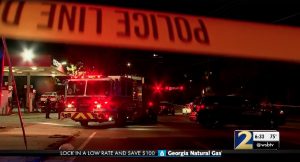
Update: Sulaiman Jalloh Identified as Victim in Oct. 15 Marathon Gas Station Shooting on Gresham Road. (AJC.com)
Could the shooting outside an Atlanta gas station have been prevented and are justice and compensation available to the victim’s family? Read Our Legal Take below to find out what legal options are available.
Local News
Update: A suspect has been arrested in connection with the shooting Oct. 15, 2019 at a gas station on Gresham Road and the victim has been identified as “39-year-old Sulaiman Jalloh,” according to AJC.com.
A man was shot in his vehicle outside an Atlanta, Georgia gas station Tuesday night, October 15, 2019.
As reported by AJC.com, “[t]he victim, described by police as in his late 30s, was found with a single gunshot wound outside…[a] gas station on Gresham Road south of I-20.”
The victim was taken to the hospital but later succumbed to his injuries.
The investigation is ongoing, no suspects have been identified.
Our Legal Take
Business patrons and guests have a right to feel safe and secure while on the premises that they are visiting. The level of security provided at the subject property is of significance, and is a relevant consideration when analyzing whether this shooting may have been prevented. The following questions are also important in assessing whether this incident may have been avoided:
- Have there been prior violent incidents near or on the property?
- What security measures were present to deter crime and protect the victim at the time of the shooting?
- Was there any reports of suspicious individuals on the property prior to the incident?
Property owners are generally required to protect against foreseeable harm to anyone and everyone legally on the premises. Should the investigation into this incident reveal facts that establish that the property owner or management lacked adequate security to protect its visitors, Sulaiman Jalloh’s family may seek justice and elect to pursue legal claims and substantial compensation for their loss.
The Murray Law Firm has extensive and successful experience in handling security negligence claims on behalf of victims and their families, and suggests that an immediate, unbiased inspection of the property will need to be performed so as to limit evidence from being altered, damaged or destroyed. The complexities of pursuing a negligent security case are well understood by the legal team at The Murray Law Firm, and it is imperative that Sulaiman Jalloh’s family retain a capable law firm who will work without delay to protect their interests.
OUR RESULTS: OVER $100 MILLION IN VERDICTS AND SETTLEMENTS FOR OUR CLIENTS
The Murray Law Firm has a long history of representing victims of violence and security negligence. We have obtained over $100 Million in verdicts and settlements for our Clients, including a $29.25 million dollar verdict for a victim of an unsafe property. We offer our legal assistance, if desired.
We represent our Clients on a contingency agreement, which generally means that no fees or payments are owed until and unless we recover. Anyone seeking further information or legal representation is encouraged to contact us via e-mail (click here) or by telephone at 404.842.1600. Consultations are free and confidential.
Click Here to Find Out How to Choose the Right Attorney
 Georgia Legal Report
Georgia Legal Report


